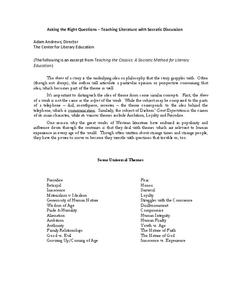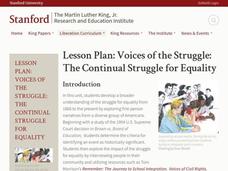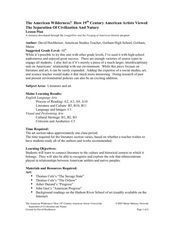Pearson
Main Idea
The main idea of this resource is that you should take a look if you're planning to teach main ideas in your class! Cover just about everything you need to know about main ideas with a packet of materials that includes information and...
Writing Educators Symposium
Asking the Right Questions
It can be difficult to find the theme of a book or story if you don't know the questions to ask. Teach your kids to discern the universal theme in works of literature with a set of activities that promote critical thinking and active...
Independence Public Library
Unmasking the Truth Behind the Red Death
"The Masque of the Red Death" provides readers with an opportunity to research and plan a presentation about a topic related to Edgar Allen Poe's classic short story.
Deer Valley Unified School District
Close Reading: Analyzing Mood and Tone
The AP Literature and Composition exam is all about close reading. Test takers are presented with a passage and asked to analyze how an author uses literary devices to create a desired effect. Prepare your students for the exam with a...
Curated OER
Creatively Creating Expository Essays
Students, after reading Fahrenheit 451, brainstorm inventions that could have been in the novel. They present their invention to the class and writing an expository essay about their creation.
Curated OER
Things Fall Apart: Research, Writing & Presentation Project
A great resource for your unit on Chinua Achebe's Things Fall Apart. Small groups conduct research about related topics (list included), write papers, present PowerPoint slide shows, and take a student-created test. Fill in a few gaps to...
Curated OER
Lesson: Urs Fischer: Reviving the Past Art Movements
Seven major abstract art movements are analyzed by learners in groups. Each group analyzes various works by determining which work belongs to which movement. They then read Flatland, engage in an art and literary analysis discussion,...
Texas Instruments
Collaborating on Flashback
Explore a flashback in a story with readers. They will read a story, identify the flashback in the story, then evaluate how the flashback is used. Using the NoteFolio, students analyze the meaning and merit of a flashback in a story....
Georgia Department of Education
Exploring Poetry and Poets
Combine the study of poetry and non-fiction texts with this complete and ready-to-use six-week unit. After reading numerous poems from local writers and compiling a personal anthology, high schoolers find and read a memoir or biography...
The New York Times
Dark Materials: Reflecting on Dystopian Themes in Young Adult Literature
The Hunger Games. Maximum Ride. Why is so much of young adult literature so dark? What is the appeal of dystopian literature to young readers? The six activities in this resource ask kids to reflect on some of the reasons this genre has...
Stanford University
Voices of the Struggle: The Continual Struggle for Equality
As part of a study of the Civil Rights Movement from 1868 to the present, class members examine first person narratives, the Supreme Court case Brown v. Board of Education, and other significant events in civil rights history. They then...
District 186 Springfield Public Schools
Tone, Mood, Theme, and Motif
It's all well and good when you're asked to identify a speaker's tone using his or her body language, facial expression, and pitch and emphasis. Identifying the tone of a written passage is another challenge entirely. Check out an...
Curated OER
Discussion Questions for Shakespeare's Julius Caeser
Do not let Julius Caesar be Greek to your pupils. Rather, make the play a dish fit for hungry minds. Encourage your class members to lend their ears to a series of rich discussion questions so that they can become masters of the play, as...
National Endowment for the Humanities
Faulkner's As I Lay Dying: Burying Addie's Voice
Students explore the use of voice and title in William Faulkner's, "As I Lay Dying". They identify and discuss the use of image, symbols and narrative voice in the story.
Curated OER
Landscapes of the Mind
Students review Emily Dickinson's biography and examine themes and forms of some of her poems. They measure ways Graham integrates aspects of Dickinson's life and the themes and forms of her poetry into Letters to the World.
National Endowment for the Humanities
Emulating Emily Dickinson: Poetry Writing
High schoolers analyze mood and voice in Emily Dickinson's poem, "There's a Certain Slant of Light." After the analysis, students write a poem of their own emulating the Dickinson poem, and then write a one-page essay describing what...
Curated OER
Exploring the Expository Scenes in Macbeth
Students examine the function of exposition in play structure. They will be able to develop multiple interpretations and visual and aural production choices for Shakespearean scenes and choose those that are most interesting.
Curated OER
Making Connections between Robert Frost's Life and His Poetry
Become acquainted with Robert Frost's life in order to allow your class to fully appreciate how his background influenced his poetry. They analyze specified poems in relation to theme, setting and the use of imagery.
Curated OER
The Perfect Society
Learners read "The Giver" by Lois Lowry and then attempt to create their own "perfect society". They work in groups to create a Powerpoint presentation outlining the rules of the ultimate society.
National Endowment for the Humanities
Practical Criticism
As an introduction to literary criticism, class members recreate I.A. Richards' close reading experiment. Individuals select a poem, paraphrase the story, focus on the imagery used, consider what the imagery adds to the tale, and...
Curated OER
The American Wilderness? How 19th Century American Artists Viewed the Separation of Civilization and Nature
The attitudes of European settlers toward the American wilderness, as reflected in art and literature, is the focus of this resource packet designed for teachers. Included in the unit overview you will find lists or paintings and works...
Scholastic
Pre-Reading Vocabulary Activities Using "The Gift of the Magi"
The rich language of O. Henry's "The Gift of the Magi" is only appreciable if you understand the words. A short lesson reviews 13 words from the story and prompts class members to apply each word and its definition to other situations.
Scholastic
Identifying Types of Irony Using "The Gift of the Magi"
O. Henry's "The Gift of the Magi" is the classic example of irony in literature. Teach young writers about the ways irony can engage their readers with an activity in which they write scripts using dramatic irony, situational irony, and...
Curated OER
The News Behind the Story
What a fun way to analyze plot, setting, and character. Learners review story elements, read a short fictional story, then turn the events of that story into a headlining news paper article. Not only does this lesson engage critical...
Other popular searches
- Subject Verb Agreement
- Subject and Predicate
- Subject and Object Pronouns
- Compound Subjects
- Simple Subject
- Complete Subject
- Subjects and Predicates
- Subject Pronouns
- Compound Subject and Predicate
- Subject Predicate
- Art Subjects
- Subject Verb Agreement

























